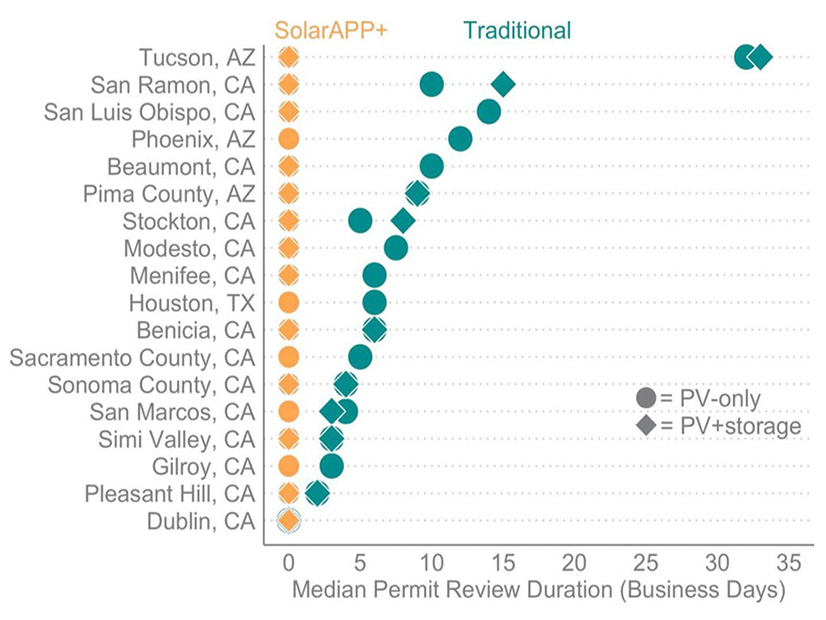
At least 44 California cities now have automated, real-time permitting systems for residential rooftop solar projects, following passage of a state law last year requiring them to adopt a permitting platform such as SolarAPP+.
Senate Bill 379, also known as the Solar Access Act, was passed to reduce approval times and permitting costs for residential solar and solar-plus-storage projects.
Turnaround times for residential solar permits have averaged two to three weeks and can often be longer than 60 days, Lucio Hernandez, energy specialist at the California Energy Commission, said during a CEC business meeting last month.
“That’s a long time to wait,” said Hernandez, who noted that the delays can cause homeowners to cancel their rooftop solar plans.
But with SolarAPP+, which was developed by the National Renewable Energy Laboratory (NREL), permitting for rooftop solar occurs in an instant.
Under SB 379, California cities with a population of more than 50,000 and counties with a population of more than 150,000 were required to adopt an online, automated permitting platform for residential solar projects by Sept. 30, 2023. Cities with a population of between 5,000 and 50,000 have until Sept. 30, 2024, to comply. Cities with a population of fewer than 5,000 and counties of fewer than 150,000 are exempt.
Implementing SolarAPP+ is one way to comply; permitting software from Symbium or custom in-house software platforms are other potential options.
SB 379 tasked the CEC with collecting solar-permitting data during the transition.
The larger jurisdictions with a Sept. 30, 2023, compliance date include 179 cities and 32 counties, according to a list the CEC provided to NetZero Insider.
As of Sept. 30, 44 cities and nine counties on that list had reported being in compliance with SB 379.
But more local governments may be complying than are shown on the list, CEC spokesperson Michael Ward said. That’s because annual reporting for many of the jurisdictions will start next year, at which time they’ll indicate whether they’ve implemented an automated permitting system and provide data on the number of permits issued. Jurisdictions aren’t required to report their compliance before submitting their annual reports, Ward said.
Varied Reasons for Non-compliance
Dave Rosenfeld, executive director of the Solar Rights Alliance, said reasons vary as to why many California cities with a Sept. 30, 2023, deadline are not yet in compliance. The nonprofit has been tracking California cities’ progress in adopting an automated, instant rooftop solar permitting process.
“Some are close and just dealing with some technical issues,” Rosenfeld told NetZero Insider. “[For] others, it is not clear what the holdup is.”
But more cities and counties are reaching full compliance each week, “so we’re hopeful that’s the trend,” Rosenfeld said.
Rosenfeld encouraged NREL and the CEC to provide as much technical support to local governments as needed, and urged elected officials to check with their building departments to see if they need help overcoming hurdles to streamlined solar permitting.
The transition to automated solar permitting got a boost from the CEC’s California Automated Permit Processing (CalAPP) grant program, launched in 2022. Cities and counties can apply for grants ranging from $40,000 to $100,000 depending on their population. As of last month, 315 grants totaling $17.5 million had been awarded, with $1.5 million remaining.
CEC Chair David Hochschild said that in contrast to the technology innovation the commission typically funds, the CalAPP money was going toward “administrative innovation.”
“But it’s more significant in many ways,” Hochschild said during the CEC’s business meeting last month. “A lot of projects do fall out because of these kind of delays.”
Data presented during the meeting showed the impact of SolarAPP+.
For example, median review time was about 15 days in San Luis Obispo, Calif., and more than 30 days in Tucson, Ariz. After deploying SolarAPP+, permit turnaround became instant in both cities. (See NREL’s SolarAPP+ Slashes Rooftop Solar Permitting Times.)
‘Extra Prodding’ Needed?
The CEC is aware that many cities are working toward compliance with SB 379, such as through participation in the CalAPP grant program.
But for some jurisdictions, the CEC is “not aware of activity” toward compliance. Those local governments “might need some extra prodding to get on board with SB 379,” according to Ward.
A list of those jurisdictions includes the city of Newport Beach, which had a Sept. 30, 2023, compliance deadline.
Newport Beach spokesperson John Pope said the city went live with SolarAPP+ this month and is now fully compliant with SB 379. A few permits have already been processed.
The CEC was also not aware of compliance activity by San Diego County. County spokeswoman Donna Durckel didn’t answer directly when asked whether the county is in compliance with SB 379.
Durckel said the county has an online process called Accela Citizen Access, in which applicants upload plans for new roof-top solar and battery storage projects. Applicants receive same-day or next-day review, comment or approval in 90 to 95% of cases. For the remaining projects, additional information is needed.
“Each year, on average, we’ve approved over 9,000 rooftop solar permits, offering online submittals and fee waivers, which makes the county of San Diego a leader in this area,” Durckel said.
